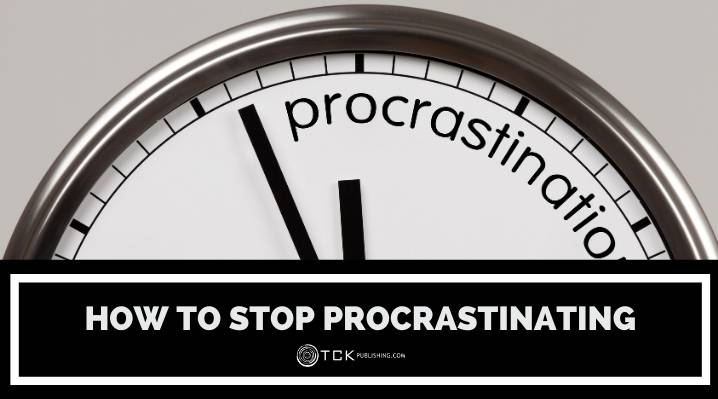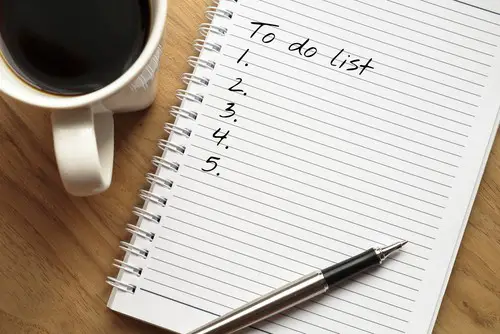
We’re all guilty of procrastinating on something once in a while, but if you find you’re constantly putting things off, you may be causing yourself unnecessary stress and complications.
Sure, you might be one of those people who claims to “thrive” on the eleventh hour madness—and that might be true the first few times. But after a while, the stress of trying to finish a task right before your deadline will catch up with you and start to affect your performance (not to mention your sanity!).
Whatever your reason for putting off a task, there’s almost always a better way to handle it. By learning to fight your procrastination tendencies, you’ll find that life will become more organized, productive, and calm.
How to Stop Procrastinating
These 8 tips can help you put an end to procrastination so you can get more done without the last-minute stress.
1. Recognize when you’re procrastinating.

The first step to overcoming procrastination is learning to recognize when and how your procrastination manifests.
If you’ve had to reprioritize your work or delay a task for a genuinely good reason, then you’re not necessarily procrastinating—you likely just had to make some adjustments in order to accommodate something more urgent.
However, if you find yourself filling your days with low-priority tasks when you know there are more pressing matters to attend to, or if you tend to leave important tasks on your To-Do list for a long time, then you might be procrastinating.
Chances are you’ve done this at some point or another, and the occasional feet-dragging doesn’t necessarily make you a procrastinator by nature. But if you notice this is becoming a habit, or if you want to eliminate this tendency altogether, you may want to reexamine your work systems.
Try carrying a notebook or using your phone to take note of when you find yourself procrastinating. (Be sure to include what you’re putting off so you can identify any patterns that might be present.)
2. Figure out why you’re procrastinating.
Whether your procrastination is a recurring issue or limited to a single project, you should take some time to reflect on why you’re putting things off.
Here are some common reasons for procrastinating:
- You find the task unpleasant or boring. (Possible solution: reward yourself.)
- You feel overwhelmed or ill-equipped to complete the task. (Possible solution: make a plan today.)
- You’re scared of failing. (Possible solution: imagine the worst that can happen, and try to accept it.)
- You don’t know what to do. (Possible solution: ask for help or guidance.)
- You want to make sure you do it perfectly. (Possible solution: work on accepting yourself and your actions even when they’re imperfect.)
These are just a few of the reasons why people tend to delay the completion of tasks, but of course you might have your own, more specific motives.
Whatever your reason, identifying the root cause of your procrastination can help you decide the best solution.
For example, if you find a task unpleasant—perhaps it’s a difficult conversation you need to have with a colleague—try to get it out of the way as soon as possible, so you can get it out of your mind and focus on the tasks you find more enjoyable.
Or, if you’re a perfectionist, give the task your best effort but try to accept that “good enough” is often better than nothing at all. You can always come back to make improvements later.
Figuring out the cause of your procrastination will help you identify the appropriate remedy. Do you need to incentivize yourself with little rewards for completing an unpleasant task? Do you need to ask for help or clarification from your boss? Finding the root of the issue will help you approach it more efficiently.
3. Prioritize your tasks and set a goal.

A big part of procrastination is a failure to appropriately prioritize tasks (intentionally or not). If you’re not sure what should be your priority, don’t be afraid to ask your supervisor, friend, or whoever you need to complete the task for.
Consider the other tasks you need to complete as part of your regular workload, as well as the urgency of this new task, and adjust your schedule accordingly.
In order to prioritize your tasks, you should also learn when and how to say “no” when necessary. If you set a new goal or priority, you’ll sometimes have to say no to other requests or tasks in order to make time for the ones you’ve deemed critical at the moment.
4. Create a plan with smaller goals and deadlines.
Next, create a plan and break your project down into smaller tasks and deadlines. This will make the job more manageable (and also less intimidating, in case that’s what’s been stopping you).
It’s also a great way to stay on track to meet your big deadline. If you have a month to complete a project, give yourself smaller tasks to complete by each Friday, or even twice a week, until the entire project is completed.
5. Change your environment.
Procrastination is in large part a mindset issue, but it’s very possible that your environment is also holding you back.
Take stock of your surroundings, identify potential distractions, and manage them accordingly. Go where other people are doing what you want (or need) to do.
Perhaps all the fun chit-chat with your cubicle mate is what’s led to your procrastination. In that case, you may need to politely tell your coworker that you can’t be disturbed during certain hours, or perhaps you need to find a quieter space to work on your project.
Maybe your phone is a problematic distraction. Turn it off (or at least silence your notifications) so you can squeeze in a few hours of optimal productivity.
6. Reward yourself.

One strategy that can be quite effective when it comes to staying motivated and on track is finding little ways to reward yourself.
You can combine this tip with #4 (breaking your project down into smaller tasks). For example, if you’re a social media fiend, turn your phone off and reward yourself with a scroll through Instagram every two hours.
Or, perhaps after you’ve finished answering 50 customer service emails, you’ll treat yourself to a piece of chocolate, or a coffee break.
The key is finding a balance that keeps you motivated but also on track. (Meaning, you can grab an espresso from the kitchen and do some stretches, but you probably shouldn’t saunter off to Starbucks for two hours if there’s still work to do that day.)
7. Tell other people about your goals.
To stay accountable, tell other people about your goals. For example, if you’ve been putting off the gym but want to get back in the game, let a trusted coworker or friend know that you’re planning to go at least three times per week.
Even if the other person isn’t personally vested in your goal, knowing that they might ask you about your progress will incentivize you to honor your commitment.
8. Keep it simple and just do it.
We’ve covered lots of steps and tips here, but don’t let that convince you that beating procrastination needs to be a complicated, detailed process.
If you spend more time planning for a task than you would actually completing it, there’s a good chance you’re making things more complicated than necessary (and perhaps using that as a way to put off the real work!).
All you need to do is figure out the one or two things you absolutely need to do right now to start working toward your goal. Give yourself a deadline, then create a simple, structured plan for reaching your target.
Why Is It So Hard to Stop Procrastinating?

If you think about it, of course it’s hard to stop procrastinating, because to stop is to do something you don’t want or are afraid to do.
But in addition to that obvious fact, procrastination is also a habit like any other. Initially, when you put something off, you get a hit of instant gratification and a rush of momentary relief, which is a type of chemical response in your brain.
If you’ve ever narrowly made a deadline, you’re probably familiar with the exhilarating rush that comes with your close call. While this can be an exciting feeling, procrastination is usually mixed with some pretty negative sentiments, such as guilt, fear, or dread. If you’ve procrastinated a few times, your body will produce the same chemical reactions based on those feelings.
Eventually, you’ll become dependent on those feelings to produce those chemicals that you’re now reliant on, just like when you crave caffeine or sugar.
It’s not easy, but like any other bad habit, you can learn to break your pattern of procrastination with commitment and resilience.
Is Procrastination a Mental Illness?
Procrastination is not a mental illness. However, it can be a characteristic of some of other mental health issues, including ADHD, depression, and anxiety.
Those with ADHD often struggle with time management, while people with depression and anxiety might suffer from low self-esteem or a fear of failure, which can lead to procrastination.
Put an End to Procrastination
Ending the vicious cycle of procrastination is just one way you can increase your productivity and stay on track to meet your goals.
For more tips on how you can get more done, check out our posts on planning productivity and consider trying some time management courses!
Did you find this post helpful? Let us know in the comments below!
If you enjoyed this post, then you might also like:
- 15 Paid Online Productivity and Time Management Courses to Help You Get More Done
- Top 8 Online Time-Tracking Tools: Improve Your Process and Productivity with Accurate Time Management
- The Pareto Principle: The 80/20 Rule for Time Management, Business, and Marketing
- 12 Best Books for Productivity: How to Do More in Less Time
As a blog writer for TCK Publishing, Kaelyn loves crafting fun and helpful content for writers, readers, and creative minds alike. She has a degree in International Affairs with a minor in Italian Studies, but her true passion has always been writing. Working remotely allows her to do even more of the things she loves, like traveling, cooking, and spending time with her family.

Wonderful! It’s interesting and educative. It truly talking to me. Thank you sir.
I’m so glad you enjoyed the article, Alumka! :)
Thanks! I have a small Health & Life Insurance Business on the side. I lost a lot of clients during the Pandemic. I think some of the clients had some financial issues. I need to reach out to the clients and leads but have put it off. I really need to give time to this business. I have another part time job and I focus more on that. I am going to use the information in this article and apply it to my life and get this business up and running again.
Thanks!
Charles
Hi Charles, thanks for your comment! I’ve definitely put off sending some emails myself :P I hope you find the tips in this post helpful, though! They’ve certainly worked for me. Best of luck!:)
Last year I started researching an article on frigatebirds that I planned to pitch to the inflight magazines. Then Covid grounded all flights along with the magazines. All my writing went on the very back burner, but I did keep researching and taking notes on other subjects. It’s been hard to get back in the actual writing saddle after a whole idle year. But I got out my sheaf of hand-written notes the other day and have rewritten my pitch letter 4 times so far. I still haven’t got it where I want it. When I’m satisfied with the pitch, then I’ll outline the article based on my notes before starting the first draft. I know how to write a good article saleable article, but after all this time, I feel like a stranger in a strange land.
Hi Diane, I can definitely relate. The last year was rough, and it can be really hard to get back into something (especially if it’s a creative something) after so much time. I haven’t read your pitch, but I think there’s a chance you might be scrutinizing it a little too much to put off actually sending it :P I would suggest letting some trusted friends or colleagues read it and see what they think. If there aren’t major issues or changes to be made, I’d say just go for it! I’m the same way sometimes, but just hitting ‘send’ after too much deliberation actually feels really good after. Then you can move on to the next thing. I hope this helps!
Create a plan with smaller goals and deadlines: I think this is the best idea in this article. I feel anxiety becomes a big issue because if it is caused by some financial insecurity, it is a serious distraction, particularly for freelancers. so, if possible, please carry some guidance for the freelancers so that they could get a feel of success.
Hi Ashok, yes I agree with your point about anxiety. I’ll work on adding some tips for freelancers :)